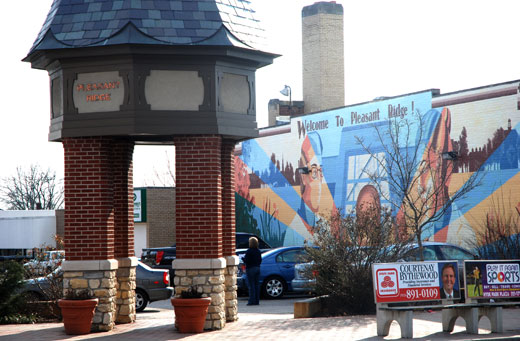
Like many neighborhood business districts, the main drag of Montgomery Road in Pleasant Ridge has lost a lot of life to big box developments by the expressway. But last week a group working to reverse that trend won five liquor licenses that they think will attract new restaurants, and new life, to Pleasant Ridge's old town center.
The
Pleasant Ridge Development Corporation (PRDC) succeeded in making Pleasant Ridge an official "Community Entertainment District" of Ohio last month, a designation that includes up to five liquor licenses from the State of Ohio.
The licenses would typically cost a restaurant between $25,000 and $30,000 apiece through a broker, PRDC project manager Bryn Lewis said. This designation will allow five restaurants to save that entire cost.
The designation is the latest step in an ongoing collaboration between Pleasant Ridge and Kennedy Heights to create a destination arts and dining district on the two-mile stretch of Montgomery road that runs through the two neighborhoods. While Kennedy Heights has seen success attracting arts groups - most recently the Cincinnati Art Museum - Lewis thinks the Entertainment District designation will fill a crucial piece of the puzzle by adding more dining to the mix.
The first application for a license was turned in by Sam Yhdego, co-owner of the Ethiopian restaurant
Emanu in Pleasant Ridge, the very day the designation went through.
"The profit margin when you have a liquor license is so much higher than when you don't." Yhdego said. "But if you go to the bank and ask for a loan to buy a liquor license, they will laugh at you. We were trying to find the cash to buy one, but it was too much."
Yhdego told Lewis about Emanu's efforts to secure a liquor license last March while Lewis was having dinner there. Afraid Emanu would close if they could not secure a license, Lewis began brainstorming ways to keep them in the neighborhood, and possibly attract more restaurants like it.
"I walked down the street after the meal, and store after store was vacant," he said. "I thought 'this would be a lot nicer if people were out here on the street at night,' and I looked at ways we could attract restaurants."
Lewis began researching liquor licenses, and he found the entertainment district designation which had been created in 2005.
The PRDC couldn't afford the application fee of $15,000 (the designations are typically won by for-profit developers,) but councilwoman Laure Quinlivan worked to change Cincinnati municipal code and make the fee downwardly flexible. That allowed the PRDC to apply without outside funding.
"This is a citizen-led action that's not dependent on an angel investor to come in and make it happen," Lewis said. "This is bootstrap ingenuity."
Writer: Henry Sweets
Photography by Scott Beseler.
Enjoy this story?
Sign up for free solutions-based reporting in your inbox each week.